Subscribe for free to finish this article!
Join tens of thousands of other founders, investors, and operators who subscribe to dot.LA for the most important tech news in their inbox 2x a week.
Get access to

Get in the KNOW
on LA Startups & Tech
XJoin tens of thousands of other founders, investors, and operators who subscribe to dot.LA for the most important tech news in their inbox 2x a week.
Get access to
Christian Hetrick is dot.LA's Entertainment Tech Reporter. He was formerly a business reporter for the Philadelphia Inquirer and reported on New Jersey politics for the Observer and the Press of Atlantic City.
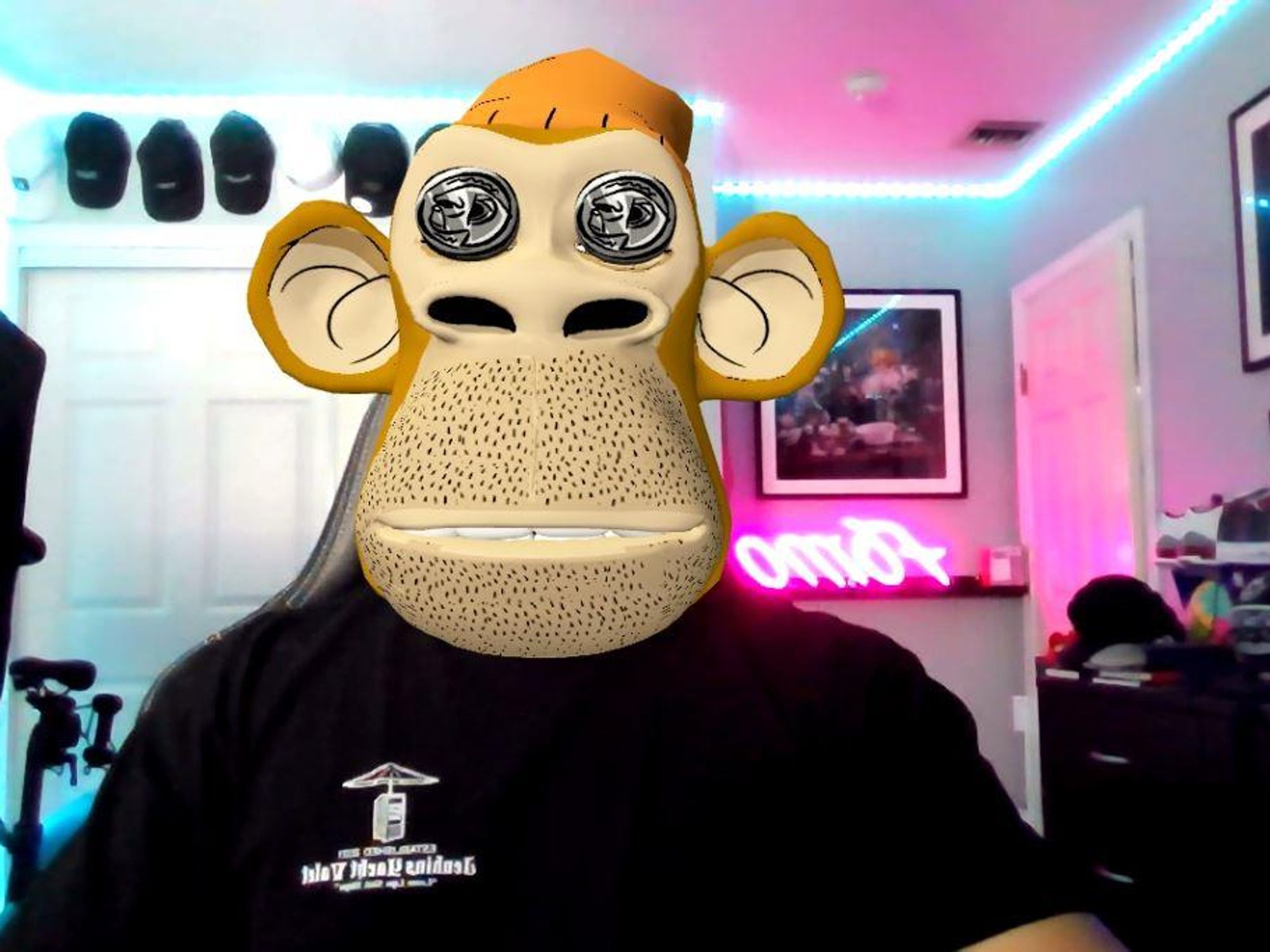
On a Zoom call last week, Gene Nubla was explaining the name and origin story he gave “Nicky Nickels,” his Bored Ape NFT who will be a character in a forthcoming novel.
Nubla’s Bored Ape Yacht Club #6717 wears a leather vest and orange beanie hat, but the cartoon ape’s most distinctive feature is the silver coins covering his eyes. The 39-year-old Nubla—an associate vice president for a flower delivery service—imagined his Bored Ape as a member of a biker gang called the “Apes of Anarchy” who died during a botched cargo heist. Loved ones sometimes place silver dollars over the eyes of the dead during funerals, but Nicky’s family used plain old nickels, Nubla told dot.LA. That somehow barred the ape from properly entering the afterlife, rendering him undead.
It may not be the best ghost story to come out of Los Angeles, but Nicky will soon haunt the pages of a book written by bestselling author Neil Strauss, who has penned autobiographies for the likes of Marilyn Manson and Jenna Jameson. Nubla has licensed Nicky to an NFT storytelling project called Jenkins the Valet, which is backed by Creative Artists Agency and will see Strauss cobble together stories from various Bored Ape holders.
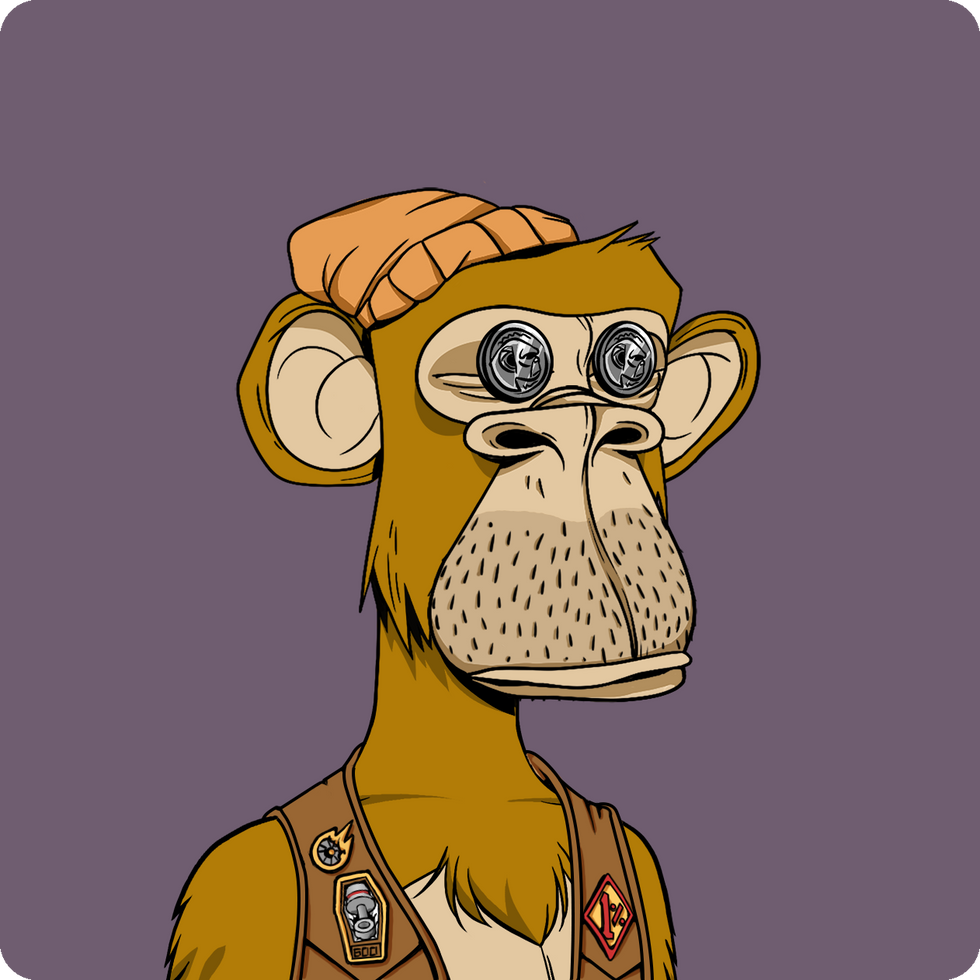
Nubla’s Bored Ape Yacht Club #6717, which he affectionately named "Nicky Nickels."
Photo courtesy of Gene Nubla“This goes into the philosophy of Web3—like, I can participate as an owner now,” said Nubla. “I'm in the door now, versus on the outside looking in and just watching the movies [and] paying the ticket.”
These days, there are scores of artists, startups and entertainment companies—as well as ordinary NFT holders—who are parlaying non-fungible tokens into commercialized intellectual property. Santa Monica-based Universal Music Group, one of the world’s largest record labels, has created a “metaverse group” consisting of four Bored Apes who ostensibly make music, while crypto exchange Coinbase is using Bored Apes as characters for a film trilogy. Talent agencies like WME and United Talent Agency, meanwhile, have added Bored Apes and other NFT characters to their client rosters.
These creative works are possible because blockchain firms like Yuga Labs, the company behind Bored Ape Yacht Club, have attached broad commercialization rights to NFTs, which are unique digital assets verified using blockchain technology. Granting those rights could boost the value of NFT collections by making them more culturally relevant, according to experts, though it remains to be seen whether such projects can appeal to audiences beyond NFT adopters.
A lot of legal questions remain, too, as actor and producer Seth Green just learned the hard way. Green is developing a hybrid live-action/animated comedy called “White Horse Tavern,” in which the creator’s own Bored Ape—whom Green affectionately named “Fred”—comes to life as a friendly neighborhood bartender. The project was almost sabotaged last month when a scammer duped Green in an online phishing scheme—stealing four of his NFTs, including Fred. Since Bored Ape NFTs come with a license to commercialize the art, Green may have momentarily lost the rights to produce the show (Fred has since returned home safely). The drama turned Green into a poster child for how sketchy the world of NFTs can still be—the “Wild West” of digital assets, as some observers have put it.
Jeremy Goldman, a Los Angeles attorney who leads the blockchain group at law firm Frankfurt Kurnit Klein & Selz, credits companies like Yuga Labs for generating immense value for their NFT collections. The problem, as he sees it, are the collections’ relatively brief terms and conditions that don’t spell out what happens in certain situations, like when an NFT is stolen. That has the risk of killing projects and productions if investors or distributors are uncertain of the consequences.
“All of these NFT projects, including Bored Ape Yacht Club, are highly experimental and in some ways were never meant for primetime,” Goldman told dot.LA. “A lot of questions about the license are sort of unanswered.”
That hasn’t stopped some entertainment tech firms from sticking NFT avatars in their stories. L.A.-based Invisible Universe is developing an animated parody called “The R3al Metaverse,” which will include characters from five NFT collections. (Disclosure: dot.LA co-founder and executive chairman Spencer Rascoff is an investor in Invisible Universe).
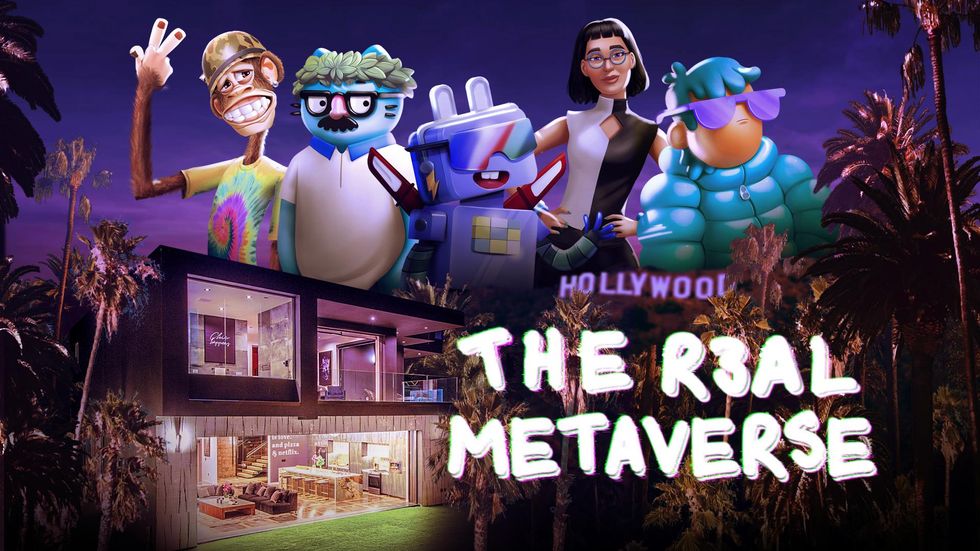
The startup bought three NFTs and secured licenses for two more that fit well with the story, CEO Tricia Biggio told dot.LA. Just to be sure, Invisible Universe approached the creators behind the NFT projects, as well. While those organizations had varying views on using the IP, they all saw the value of Invisible Universe’s project, she noted.
“It was funny—some of them would be like, ‘Well, you actually don't have to run it by us,’” Biggio said.
In “The R3al Metaverse,” NFTs who live in the digital world come over to the real one after they’re cast in a reality TV show and move in together. The parody pokes fun at the debate around the value of NFTs, as well: In one episode, the characters stare at a painting and are confused by its lack of “real-world application” besides being a wall decoration. (“Like zero utility,” one observes, according to a storyboard of the scene.) Invisible Universe will release around 40 episodes of the program on social media platforms starting in late July, with each episode running between 45 and 90 seconds.
Who will watch a show about NFTs—which, for all of their recent hype, are still owned by just a tiny fraction of the population? Biggio said that the audience for “The R3al Metaverse” will primarily be holders of its featured NFT communities: Bored Ape Yacht Club, Cool Cats, Doodles, World of Women and Robotos, which collectively have roughly 50,000 tokens in circulation. That said, Biggio believes the show can build an audience outside the not-yet-mainstream NFT market and, in turn, boost the value of those collections.
“Because we aren't gating the content, we have a unique opportunity to onroad people into the Web3 space who enjoy the content, fall in love with the characters and want to be a part of the collaborative storytelling experience,” Biggio said.
At their most basic level, NFTs—like artwork at large—generate much of their value from their scarcity and cultural relevance. Yet companies like Yuga Labs have popularized the idea of giving NFT holders commercial rights as well, allowing Bored Ape holders to put their ape’s face on a t-shirt or other merchandise and sell it. That not only makes the NFT itself more lucrative, but may well make the entire collection more valuable as Bored Apes are plastered on storefronts or featured in films.
“By giving broad IP rights—either making them public domain or granting commercial rights to holders—you're increasing the chances, potentially, that these items are going to get out there and go viral and become culturally relevant, and therefore sought after,” said Goldman, the attorney.
Bill Starkov, a real estate developer who lives near Calabasas, “right by the Kardashians,” in his words, is the founder of another primate-inspired NFT project, Apocalyptic Apes. (The collection’s zombified primates look like scarier versions of Bored Apes.) Starkov said his team gave NFT holders the right to do “whatever you want” with the artwork—so long as they don’t use the Apocalyptic Apes brand name. “We have to make sure they use it properly enough and it's used to promote our project and our brand in a good way,” he explained.
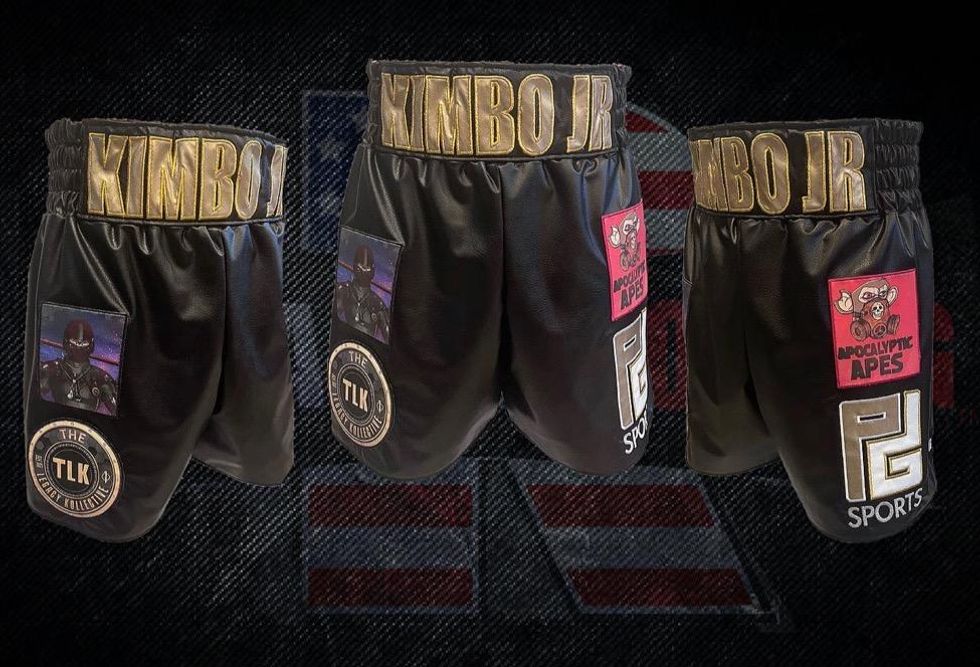
Apocalyptic Ape holders have placed their simians on hot sauce bottles, exercise equipment and sunglasses, he noted, while on the entertainment side, a car-racing game, comic books and movies depicting the apes are all in the works, too. Starkov, who goes by Fity.Eth online, has also partnered with Nicky Diamonds, the owner of clothing company Diamond Supply, on licensing deals with Ape holders to create merchandise. Those deals are generating tens of thousands of dollars for ape holders who collaborated with Diamond, he said.
“One thing that people are sleeping on is the understanding of IP rights,” Starkov said of some people in the NFT community. “They think it's a quick flip, but it's not. It's something long-term. It's something that's here to stay. It's a unique opportunity to create wealth.”
Nubla is among the NFT holders who have taken advantage of those IP rights. Speaking through an augmented reality filter on his computer that made him look like Nicky Nickels, Nubla said he’s earned some cash by allowing artists to make works based on his Bored Ape, including one artist who sells lapel pins bearing NFT art. A street painting of Nicky also adorns the side of a brick building in Brooklyn—part of a mural by the graffiti artist Masnah, who was paid for his work by NFT holders.
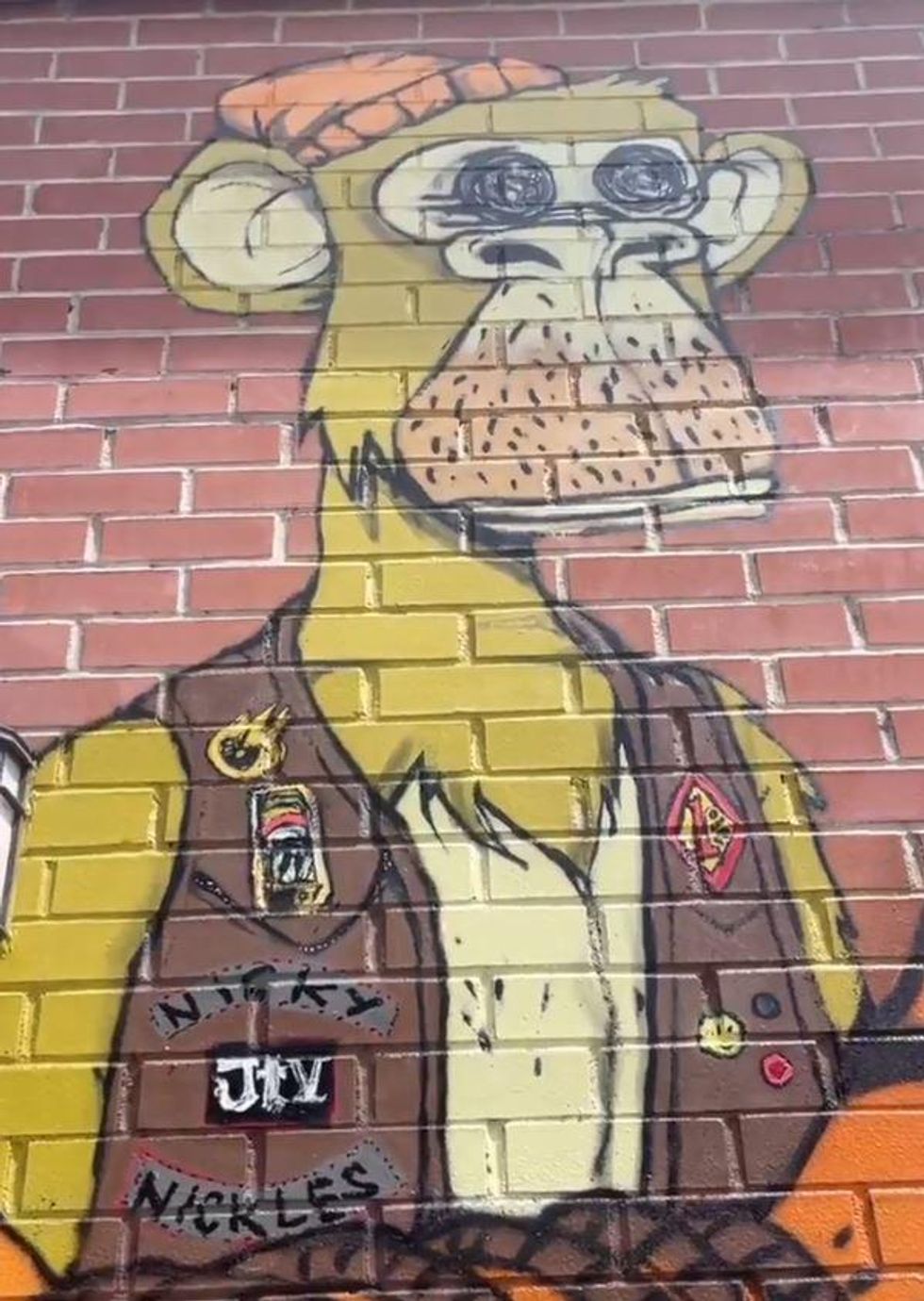
When the Florida-based startup Tally Labs launched the Jenkins the Valet project last June, Nubla was one of the 69 lucky people to randomly mint a rare “Yacht” NFT. That allowed him to license his Bored Ape as a character in Strauss’ novel and receive a share of the book’s royalties. Nubla debated selling the Yacht NFT as its value reached six figures, but ultimately decided to keep it and build out Nicky’s IP “just to see where it goes.”
Nubla does see some risk in NFT collections decentralizing their IP; he noted that there isn’t much stopping another Bored Ape holder from using their NFT to promote ideas or views that others may disagree with or find offensive. But like a lot of people involved in the space, he’s enamored with the idea of Web3—a decentralized vision for the internet that runs on blockchain-powered applications.
“It'd be nice to be able to benefit off the royalties of anything that comes off this,” Nubla said of the Strauss novel, which is coming out this summer. “But I'm doing it mainly just for the vibes.”
Christian Hetrick is dot.LA's Entertainment Tech Reporter. He was formerly a business reporter for the Philadelphia Inquirer and reported on New Jersey politics for the Observer and the Press of Atlantic City.
Samson Amore is a reporter for dot.LA. He holds a degree in journalism from Emerson College. Send tips or pitches to samsonamore@dot.la and find him on Twitter @Samsonamore.
According to a Forbes report last April, both the viewership and dollars behind women’s sports at a collegiate and professional level are growing.
In 2022, the first 32 games of the NCAA tournament had record attendance levels, breaking records set back in 2004, and largely driven by the new and rapidly growing women’s NCAA tournament. WNBA openers this year saw a 21% spike in attendance, with some teams including the LA Sparks reporting triple-digit ticket sales growth, about 121% over 2022’s total. In 2023, the average size of an LA Sparks crowd swelled to 10,396 people, up from 4,701 people.
Women make up half the population, but “also 50% of the folks that are walking into the stadium at Dodger Stadium, or your NFL fans are just about 50% women,” noted Erin Storck, a panelist and senior analyst at Los Angeles-based Elysian Park Ventures.
Storck added that in heterosexual households, women generally manage most of the family’s money, giving them huge purchasing power, a potential advantage for female-run leagues. “There's an untapped revenue opportunity,” she noted.
In the soccer world, Los Angeles-based women’s soccer team Angel City FC has put in the work to become a household name, not just in LA County but across the nation. At an LA Tech Week panel hosted by Athlete Strategies about investing in sports, Angel City head of strategy and chief of staff Kari Fleischauer said that years before launching the women’s National Women’s Soccer League team, Angel City FC was pounding the pavement letting people know about the excitement ladies soccer can bring. She noted community is key, and that fostering a sense of engagement and safety at the team’s home venue, BMO stadium (formerly Banc of California Stadium), is one reason fans keep coming back.
Adding free metro rides to BMO stadium and private rooms for nursing fans to breastfeed or fans on the spectrum to avoid sensory overload, were just some of the ways ACFC tried to include its community in the concept of its stadium, Fleischauer said. She noted, though, that roughly 46% of Angel City fans are “straight white dudes hanging out with their bros.”
“Particularly [on] the woman's side, I'd like to think we do a better job of making sure that there's spaces for everyone,” Fleischauer told the audience. “One thing we realize is accessibility is a huge thing.”
Samson Amore is a reporter for dot.LA. He holds a degree in journalism from Emerson College. Send tips or pitches to samsonamore@dot.la and find him on Twitter @Samsonamore.
L.A. Tech Week has brought venture capitalists, founders and entrepreneurs from around the world to the California coast. With so many tech nerds in one place, it's easy to laugh, joke and reminisce about the future of tech in SoCal.
Here's what people are saying about the fifth day of L.A. Tech Week on social:
#LATechWeek has been on 🔥🔥🔥. Yes the events are super cool at amazing venues. But, I’m blown away by the people. I’ve met so many founders building generative AI companies from the ground up. I’m so bullish on LA right now🥳. LA is for builders #longLA
Thanks @rpnickson 📸 pic.twitter.com/B6rT2jJYIs
— Dr. Kelly O'Brien (@Kvo2013) June 8, 2023
Successful LatinxVC Avanza Summit 2023 in LA! It’s been an amazing few days near the beach w great company. Thank you to our panelists & participants.
Huge thanks to our incredible sponsors SVB, Chavez Family Foundation, Annenberg Foundation, PledgeLA, Fenwick & West, Countsy! pic.twitter.com/oVuGIgFurk
— LatinxVC (@LatinxVCs) June 9, 2023
30+ gaming startups presented at the A16z Speedrun Demo Day in LA yesterday. Great thanks to the @a16zGames team for an awesome day of events! #LATechWeek pic.twitter.com/DKq8IFo5QZ
— Grace Zhou (@graceminzhou) June 9, 2023
📣🤩 What’s the buzz? It’s #LATechWeek from @TechstarsLA & @TechstarsHealth joint demo day with the #Techstar HC team where our @fyelabs founder/CEO Suvojit Ghosh mentored both cohorts! #TechStars demo day highlighted 12 amazing emerging #startups in #healthtech #innovation. 🩺 pic.twitter.com/0RXClCtfDQ
— FYELABS (@fyelabs) June 9, 2023
Another successful Coffee On Slauson in the books for #LATechWeek.
Special thanks to the good people at Pledge LA, SVB and @GundersonLaw for the ongoing support and the @findyourhilltop staff for providing the space, eats & vibes. ♻️ pic.twitter.com/51cMDoEn30
— Slauson & Co. (@SlausonAndCo) June 9, 2023
The perfect combo to start #LATechWeek Day 5: pastries, coffee, and great convos with industry founders ✨
Fireside chats with @enriquealle, @wp, and @robynpark pic.twitter.com/booYPdekVV
— Tech Week (@Techweek_) June 9, 2023
Of course @designerfund has the most amazing pastries at their event. #LATechWeek pic.twitter.com/PjyWlGTQI4
— Jesse Pickard (@jessepickard) June 9, 2023
My favorite event from @Techweek_ has to be "Modern Storytelling & Business Building." Hosted by @STHoward #LATechWeek pic.twitter.com/SV1eexMJ4k
— JonnyZeller (@JonnyZeller) June 9, 2023
And the finale of the night was courtesy of the one and only @zedd for an unforgettable end to the "City of Games" party! Hosted by @a16zGames and @100Thieves #LATechWeek pic.twitter.com/hliI9yLKse
— Tech Week (@Techweek_) June 9, 2023
Excited to be at the @a16zGames Speedrun Demo Day! Loved the energy and excitement from the companies that pitched there. It was also great to see @Tocelot and @ndrewlee at this amazing #LATechWeek event pic.twitter.com/NfLQO5lR27
— Andy Lee | andypwlee.bit (@andypwlee) June 9, 2023
Thank you to everyone who joined the Sony Venture Fund US team at #LATechWeek for our screening of Spider-Man: Across the Spider-Verse. Last summer, we started building a presence in LA. Today, it's exciting to host such an event with the @Sony family and the LA VC community. pic.twitter.com/wdDm6qtHdL
— Sony Innovation Fund (@Sony_Innov_Fund) June 9, 2023
Time to eat, connect and build while @remi_rodney provided the vibes. 🙏🏽#LATechWeek @BuildOnBase @developer_dao @WeAreRazorfish pic.twitter.com/QIPh1gjvoA
— Hola Metaverso-Blockchain & New Web Tech Events 🎪 (@holametaverso) June 9, 2023
@Lux_Capital at #LATechWeek advancing the impossible to inevitable, from..
..defense primes partnering with cutting edge defense tech startups, to..
..hardware x LLMs improving mental health.
From the rich and diverse LA ecosystem stems generational companies: pic.twitter.com/v5S5r8JtbU
— Shahin Farshchi (@Farshchi) June 9, 2023
LA Tech Week has been a blast! Met some amazing creators, founders and investors from all over the world! #LATechWeek pic.twitter.com/AAh9JFELhe
— Chris Germano (@netslayer) June 9, 2023
Had such a blast at LA Tech Week and hosting events for @brexHQ
Top highlights were collabing with @pulley on an Emerging Managers / Founder mixer at the @poplco House, rooftop event in Venice, creator panel with @thechangj & proper Korean food with in KTown.
Exhausted is an… pic.twitter.com/mGQnSYGPdg
— Τyler Robinson (@TyyRob3) June 9, 2023
Did you have fun at @sophiaamoruso’s launch party for @trustfundvc? #LATechWeek pic.twitter.com/gbrbXRQ9Xx
— Kay (@KaySnels) June 9, 2023
y00tilty in every city with @KaylaLor3n & @cryptochrisg813.
Welcome to the LA @y00tsNFT fam! #LATechWeek #3XP week. pic.twitter.com/6wWKlsTacx
— VanG0xH (@CryptoVanGoghs) June 9, 2023
Really enjoyed #LATechWeek. Here are some observations I made 👇
— s.personal.ai (Suman Kanuganti) (@SumanPersonalAI) June 9, 2023
Thank you @TheKofiAmpadu for including me in #demoday with the latest @a16ztxo cohort! It was a real full circle moment to witness the brilliance of both @ChrisLyons & @ZMuse_ & #PledgeLA very own. She’s why we’re #LongLA 🚀💕 #LAtechweek pic.twitter.com/itkKXMxQRb
— Qiana Qiana! (@Q_i_a_n_a) June 9, 2023
@upfrontvc Gaming Founders Podcast #iLOVELA #LATechWeek @Techweek_ @KatiaAmeri @mucker @fikavc @bonfire_vc @TenOne10 @WatertowerGroup @ganasvc @IAmRobRyan @john_at_stonks @eva_ho @dereknorton pic.twitter.com/LCbaGXCoW7
— Sean Goldfaden (@seangoldfaden) June 9, 2023
Hosts Kevin Zhang, Partner at @upfrontvc, and Eden Chen, CEO of @pragmaplatform, interviewed two special guests from @raidbaseinc Stephen Lim, Co-Founder & Product Director, and Trevor Romleski, Co-Founder & Game Director. 🎙 #LATechWeek pic.twitter.com/hxHEAoELZ6
— Tech Week (@Techweek_) June 9, 2023
Kicking off @a16zGames @100Thieves City of Games party at #LATechWeek 🔥🔥🔥 pic.twitter.com/zQcZedG15f
— Jon Lai (@Tocelot) June 9, 2023
Yesterday at @socinnovation I got to have this AWESOME conversation with @iamwill — musician, producer, technology entrepreneur, and Founder & CEO of https://t.co/D60y1e2JOu #LATechWeek pic.twitter.com/KBxK6rXyTG
— Anna Barber (@annawbarber) June 9, 2023
I absolutely love this game. Proud moment for the team @investwithatlas. #LATechWeek pic.twitter.com/fPZvKXU7TC
— Tobias Francis (@TobiasFrancis) June 9, 2023
Had a blast at LA Tech Week this year with @brexHQ
From hosting & moderating my first creator panel featuring @BlakeMichael14, to a fun rooftop night in Venice, and to attending some amazing events such as Watertower’s emerging manager panel and a VC/founder tennis tournament pic.twitter.com/udjfmLHE0L
— Jonathan Chang (@thechangj) June 8, 2023
Samson Amore is a reporter for dot.LA. He holds a degree in journalism from Emerson College. Send tips or pitches to samsonamore@dot.la and find him on Twitter @Samsonamore.
At Lowercarbon Capital’s LA Tech Week event Thursday, the synergy between the region’s aerospace industry and greentech startups was clear.
The event sponsored by Lowercarbon, Climate Draft (and the defunct Silicon Valley Bank’s Climate Technology & Sustainability team) brought together a handful of local startups in Hawthorne not far from LAX, and many of the companies shared DNA with arguably the region’s most famous tech resident: SpaceX.
Here’s a look at the greentech startups that pitched during the Tech Week event, and how they think what they’re building could help solve the climate crisis.
Arbor: Based in El Segundo, this year-old startup is working to convert organic waste into energy and fresh water. At the same time, it also uses biomass carbon removal and storage to remove carbon from the atmosphere and sequester it in an attempt to avoid further damaging the earth’s ozone layer. At the Tech Week event Thursday, Arbor CEO Brad Hartwig told a stunned crowd that Arbor aims to remove about five billion tons of organic waste from landfills and turn that into about 6 PWh, or a quarter of the global electricity need, each year. Hartwig is an alumni of SpaceX; he was a manufacturing engineer on the Crew Dragon engines from 2016-2018 and later a flight test engineer at Kitty Hawk.
Antora: Sunnyvale-based Antora Energy was founded in 2017, making it one of the oldest companies on the pitching block during the event. Backed by investors including the National Science Foundation and Los Angeles-based Overture VC, Antora has raised roughly $57 million to date, most recently a $50 million round last February. Chief operating officer Justin Briggs said Antora’s goal is to modernize and popularize thermal energy storage using ultra-hot carbon. Massive heated carbon blocks can give off thermal energy, which Antora’s proprietary batteries then absorb and store as energy. It’s an ambitious goal, but one the world needs at scale to green its energy footprint. According to Briggs, “the biggest challenge is how can we turn back variable intermittent renewable electricity into something that's reliable and on demand, so we can use it to provide energy to everything we need.”
Arc: Hosting the panel was Arc, an electric boating company that’s gained surprising momentum, moving from design to delivering its first e-boats in just two years of existence. Founded in 2021, the company’s already 70 employees strong and has already sold some of its first e-boats to customers willing to pay the luxury price tag, CTO Ryan Cook said Thursday. Cook said that to meet the power needs of a battery-powered speedboat, the Arc team designed the vehicle around the battery pack with the goal of it being competitive with gas boats when compared to range and cost of gas. But on the pricing side, it’s not cheap. Arc’s flagship vessel, the Arc One is expected to cost roughly $300,000. During the panel, Cook compared the boat to being “like an early Tesla Roadster.” To date Arc Boats has raised just over $35 million, according to PitchBook, from investors including Kevin Durant, Will Smith and Sean “Diddy” Combs.
Clarity Technology: Carbon removal startup Clarity is based in LA and was founded by Yale graduate and CEO Glen Meyerowitz last year. Clarity is working to make “gigaton solutions for gigaton problems.” Their aim? To remove up to 2,000 billion pounds of carbon from the atmosphere through direct air capture, a process which uses massive fans to move chemicals that capture CO2. But the challenge, Meyerowitz noted in his speech, is doing this at scale in a way that makes an actual dent in the planet’s emissions while also efficiently using the electricity needed to do so. Meyerowitz spent nearly five years working as an engineer for SpaceX in Texas, and added he’s looking to transfer those learnings into Clarity.
Parallel Systems: Based in Downtown LA’s Arts District, this startup is building zero-emission rail vehicles that are capable of long-haul journeys otherwise done by a trucking company. The estimated $700 billion trucking industry, Parallel Systems CEO Matt Soule said, is ripe for an overhaul and could benefit from moving some of its goods off-road to electric railcars. According to Soule, Parallel’s electric battery-powered rail vehicles use 25% of the energy a semi truck uses, and at a competitive cost. Funded in part by a February 2022 grant from the U.S. Department of Energy, Parallel Systems has raised about $57 million to date. Its most recent venture funding round was a $49 million Series A led by Santa Monica-based VC Anthos Capital. Local VCs including Riot Ventures and Santa Monica-based Embark Ventures are also backers of Parallel.
Terra Talent: Unlike the rest of the startups pitching at the Tech Week event, Terra Talent was focused on building teams rather than technology. Founder Dolly Singh worked at SpaceX, Oculus and Citadel as a headhunter, and now runs Terra, a talent and advisory firm that helps companies recruit top talent in the greentech space. But, she said, she’s concerned that all the work these startups are doing won’t matter unless we very quickly turn around the current trendlines. “Earth will shake us off like and she will do just fine in 10,000 years,” she said. “It’s our way of living, everything we love is actually here on earth… there’s nothing I love on Mars,” adding that she’s hopeful the startups that pitched during the event will be instrumental in making sure the planet stays habitable for a little while longer.
Samson Amore is a reporter for dot.LA. He holds a degree in journalism from Emerson College. Send tips or pitches to samsonamore@dot.la and find him on Twitter @Samsonamore.